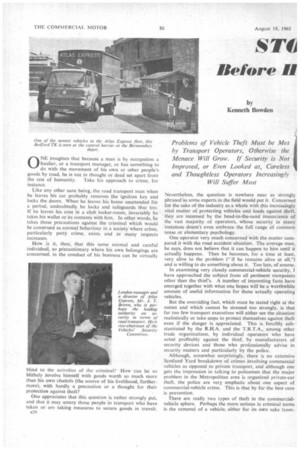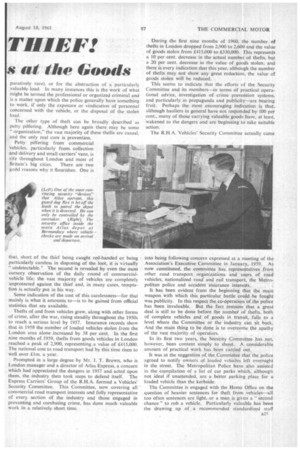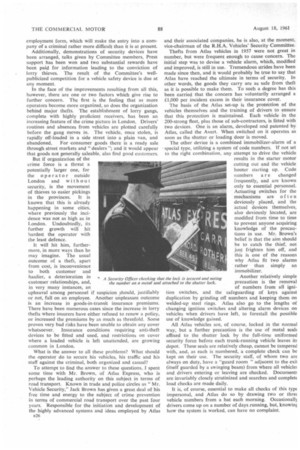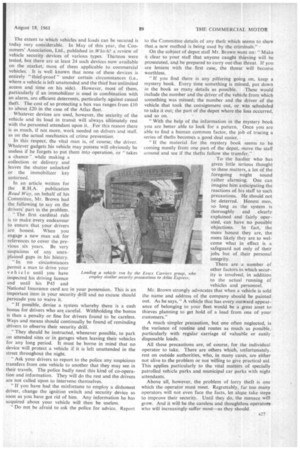S TO
Page 58

Page 59

Page 60

Page 61

If you've noticed an error in this article please click here to report it so we can fix it.
THIEF!
Before II
s at the Goods
Problems of Vehicle Theft Must be Met by Transport Operators, Otherwise the Menace Will Grow. If Security is Not Improved, or Even Looked at, Careless and Thoughtless Operators Increasingly Will Suffer Most
by Kenneth Bowden
0 NE imagines that because a man is by occupation a haulier, or a transport manager, or has something to do with the movement of his own or other people's goods by road, he is not in thought or deed set apart from the rest of humanity. Take his approach to crime, for instance.
Like any other sane being, the road transport man when he leaves his car probably removes the ignition key and locks the doors. When he leaves his home unattended for a period, undoubtedly he locks and safeguards that too. If he leaves his coat in a club locker-room, invariably he takes his wallet or its contents with him. In other words, he takes those precautions against the criminal which would be construed as normal behaviour in a society where crime, particularly petty crime, exists and in many respects increases.
How, is it, then, that this same normal and careful individual, so precautionary where his own belongings are concerned, in the conduct of his business can be virtually
blind to the activities of the criminal? • How can he so blithely involve himself with goods worth so much more than his own chattels (the source of his livelihood, furthermore), with hardly a precaution or a thought for their protection against theft?
One appreciates that this question is rather strongly put, and that it may annoy those people in transport who have taken or are taking measures to secure goods in transit. n24 Nevertheless, the question is nowhere near as strongly phrased as some experts in the field would put it. Concerned for the sake of the industry as a whole with this increasingly vital matter of protecting vehicles and loads against theft, they are incensed by the head-in-the-sand insouciance of the vast majority of operators, whose security in many instances doesn't even embrace the full range of common sense or elementary psychology.
One operator very much concerned with the matter compared it with the road accident situation. The average man, he says, does not believe that it can happen to him until it actually happens. Then he becomes, for a time at least, very alive to the problem C' if he remains alive at all,") and is willing to do something about it. Too late, of course.
In examining very closely commercial-vehicle security, I have approached the subject from all pertinent viewpoints other than the thief's. A number of interesting facts have emerged together with what one hopes will be a worthwhile amount of useful information for those actually operating vehicles.
But the overriding fact, which must be stated right at the outset and which cannot be stressed too strongly, is that far too few transport executives will either see the situation realistically or take steps to protect themselves against theft even if the danger is appreciated. This is forcibly substantiated by the R.H.A. and the T.R.T.A., among other trade organizations, by individual operators who have acted profitably against the thief, by manufacturers of security devices and those who professionally advise in security matters and particularly by the police.
Although, somewhat surprisingly, there is no extensive Scotland Yard breakdown of crimes involving commercial vehicles as opposed to private transport, and although one gets the impression in talking to policemen that the major problem in the Metropolitan area is organized private-car theft, the police are very emphatic about one aspect of commercial-vehicle crime. This is that by far the best cure is prevention, There are really two types of theft in the commercialvehicle sphere. Perhaps the more serious in criminal terms is the removal of a vehicle, either for its own sake (corn paratively rare), or for the abstraction of a particularly valuable load. In many instances this is the work of what might be termed the professional or organized criminal and is a matter upon which the police generally have something to work, if only the exposure or vindication of personnel concerned with the vehicle, or the disposal of the stolen load.
'The other type of theft can be broadly described as petty pilfering. Although here again there may be some " organization," the vast majority of these thefts are casual. and the only real cure is prevention.
Petty pilfering from commercial vehicles, particularly from_ collection and delivery and small carriers' vans, is rife throughout London and most of Britain's big cities. There are two goad reasons why it flourishes. One is that, short of the thief being caught red-handed or being particularly careless in disposing of the loot, it is virtually "undetectable." The second is revealed by even the most cursory observation of the daily round of commercialvehicle life: the vast majority of vehicles are completely unprotected against the thief and, in many cases, temptation is actually put in his way.
Some indication of the cost of this carelessness—for that mainly is what it amounts to—is to be gained from official statistics that are available.
Thefts of and from vehicles grew, along with other forms of crime, after the war, rising steadily throughout the 1950s to reach a serious level by 1957. Insurance records show that in 1958 the number of loaded vehicles stolen from the London area alone increased by 38 per cent. In the first nine months of 1959, thefts from goods vehicles in London reached a peak of 2,900, representing .a value of £415,000. The national cost to road transport had by this time risen to well over £1m. a year.
Prompted in a large degree by Mr. J. T. Brown, who is London manager and a director of Atlas Express, a concern which had appreciated the dangers in 1957 and acted upon them, the industry then took steps to defend itself. The Express Carriers' Group of the R.H.A. formed a Vehicles' Security Committee. This Committee, now covering all commercial road transport interests and fully representative of every section of the industry and those engaged in preventing and combating crime, has done much valuable work in a relatively short time. During the first nine months of 1960, the number of thefts in London dropped from 2,900 to 2,600 and the value of goods stolen from £415,000 to £330,000. This represents a 10 per cent, decrease in the actual number of thefts, but a 20. per cent. decrease in the value of goods stolen; and there is every indication that this year, although the number of thefts may not show any great reduction, the value of goods stolen will be reduced.
This seems to indicate that the efforts of the Security Committee and its members—in terms of practical operational advice, investigation of crime prevention systems, and particularly in propaganda and publicity—are bearing fruit. Perhaps the most encouraging indication is that, although hauliers in general have not responded by 100 per cent., many of those carrying valuable goods have, at least, wakened to the dangers and are beginning to take suitable action.
The R.H.A. Vehicles' Security Committee actually came into being following concern expressed at a meeting of the Association's Executive Committee in January, 1959. As now constituted, the committee has representatives from other road transport organizations and users of road vehicles, nationalized road and rail transport, the Metropolitan police and accident insurance interests.
It has been evident from the beginning that the main weapon with which this particular battle could be fought was publicity. In this respect the co-operation of the police has been invaluable. But the fact remains that a great deal is still to be done before the numbee of thefts. both of complete vehicles and of goods in transit.. falls to a level where the Committee or the industry can sit back. And the main thing to be done is to overcome the apathy of the vast majority of operators.
In its first two years, the Security Committee has not, however, been content simply to shout. A considerable amount of practical work has been carried out.
It was at the suggestion of. the Committee that the police agreed to notify owners of loaded vehicles left overnight in the street. The Metropolitan Police have also assisted in the compilation of a list of car parks which, although not ideal if unattended, are a better parking place for a loaded vehicle than the kerbside.
The Committee is engaged with the Home Office on the question of heavier sentences for theft from vehicles—all too often sentences are light, or a man is given a "second chance" to rob a vehicle. Particularly valuable has been the drawing up of a recommended standardized staff employment form, which will make the entry into a company of a criminal rather more difficult than it is at present. Additionally, demonstrations of security devices have been arranged, talks given by Committee members, Press support has been won and two substantial rewards have been paid for information leading to the conviction of lorry thieves. The result of the Committee's wellpublicized competition for a vehicle safety device is due at any moment.
In the face of the improvements resulting from all this, however, there are one or two factors which give rise to further concern. The first is the feeling that as more operators become more organized, so does the organization behind major thefts. The establishment of lorry gangs, complete with highly proficient receivers, has been an increasing feature of the crime picture in London. Drivers' routines and absences from vehicles are plotted carefully before the gang moves in. The vehicle, once stolen, is rapidly off-loaded in a side street into a plain van, and abandoned. For consumer goods there is a ready sale through street markets and "dealers ".; and it would appear that goods not generally saleable, also find good customers.
But if organization of the crime force is a threat a potentially larger one, for the operator outside London and without security, is the movement of thieves to easier pickings in the provinces. It is known that this is already happening in some cities, where previously the incidence was not as high as in London. Undoubtedly, its further growth will hit hardest the operator with the least defence.
It will hit him, furthermore, in more ways than he may imagine. The usual outcome of a theft, apart from cost, is inconvenience to both customer and haulier, a deterioration in customer relationships, and, in very many instances, an upheaval among personnel if suspicion should, justifiably or not, fall on an employee. Another unpleasant outcome is an increase in goods-in-transit insurance premiums. There have been numerous cases since the increase in lorry thefts where insurers have either refused to renew a policy, or increased the premiums by as much as threefold. Some proven very bad risks have been unable to obtain any cover whatsoever. Insurance conditions requiring anti-theft devices to be fitted and used, and restrictions on cover where a loaded vehicle is left unattended, are growing common in London.
What is the answer to all these problems? What should the operator do to secure his vehicles, his traffic and his staff against the criminal, both organized and casual?
To attempt to find the answer to these questions, I spent some time with Mr. Brown, of Atlas Express, who is perhaps the leading authority on this subject in terms of road transport. Known in trade and police circles as "Mr. Vehicle Security," Jack Brown has given a great deal of his free time and energy to the subject of crime prevention in terms of commercial road transport over the past four years. Responsible for the initiation and development of the highly advanced systems and ideas employed by Atlas B26 and their associated companies, he is also, at the moment, vice-chairman of the R.H.A. Vehicles' Security Committee. Thefts from Atlas vehicles in 1957 were not great in number, but were frequent enough to cause concern. The initial step was to devise a vehicle alarm, which, modified and improved, is still in use. Tremendous strides have been made since then, and it would probably be true to say that Atlas have reached the ultimate in terms of security. In other words, the goods they carry are as safe from theft as it is possible to make them. To such a degree has this been carried that the concern has voluntarily arranged a £1,000 per incident excess in their insurance cover.
The basis of the Atlas set-up is the protection of the vehicles themselves and the training of drivers to ensure that this protection is maintained. Each vehicle in the 200-strong fleet, plus those of sub-contractors, is fitted with two devices. One is an alarm, developed and patented by Atlas, called the Avert. When switched on it operates as soon as the shutter or loading door is moved.
The other device is a combined immobilizer-alarm of a special type, utilizing a system of code numbers. If not set to the right combination, any attempt to drive the vehicle results in the starter motor cutting out and the vehicle hooter starting up. Code numbers a r e changed frequently, and are known only to essential personnel. Actuating switches for the mechanisms are of ten deviously placed, and the actual devices themselves, also deviously located, are modified from time to time to prevent anyone acquiring knowledge of the precautions in use. Mr. Brown's belief is that the aim should be to catch the thief, not just frighten him off, and this is one of the reasons why Atlas fit two alarms rather than simply an immobilizer.
Another relatively simple precaution is the removal of numbers from all ignition switches, and the safeguarding of keys against duplication by grinding off numbers and keeping them on welded-up steel rings. Atlas also go to the lengths of changing ignition switches and altering alarm devices on vehicles when drivers have left, to forestall the possible use of knowledge gained.
All Atlas vehicles are, of course, locked in the normal way, but a further precaution is the use of metal seals affixed to the shutter Jock by the full-time uniformed security force before each trunk-running vehicle leaves its depot. These seals are relatively cheap, cannot be tampered with, and, as each is numbered, a complete check can be kept on their use. The security staff, of whom two are always on duty, have a "guard room "adjacent to the exil (itself guarded by a swinging beam) from where all vehicles and drivers entering oa: leaving are checked. Documents are invariably closely strutinized and searches and complete load checks are made daily.
It is, of course, essential to make all checks of this type impersonal, and Atlas do so by drawing two or three vehicle numbers from a hat each morning. Occasional!) drivers come up on a number of days running, but, knowini how the system is worked, can have no complaint.
The extent to which vehicles and loads can be secured is today very considerable. In May of this year. the Consumers' Association, Ltd., published in Which? a review of vehicle security devices of various types. Thirteen were tested, but there are at least 24 such devices now available on the market, most of them applicable to commercial vehicles. It is well known that none of these devices is entirely "thief-proof" under certain circumstances (i.e., where a vehicle is left unattended and the thief has unlimited access and time on his side). However, most of them, particularly if an immobilizer is used in combination with an alarm, are efficient deterrents, particularly against casual theft. The cost of so protecting a box van ranges from £10 to about £20 in the case of the Atlas fleet.
Whatever devices are used, however, the security of the vehicle and its load in transit will always ultimately rest with the personnel attendant upon it. For this reason there is as much, if not more, work needed on drivers and staff, as on the actual mechanics of crime prevention.
In this respect, the vital man is, of course, the driver.
Whatever gadgets his vehicle may possess will obviously be useless if he forgets to put them into operation, or "takes
a chance" while making a collection or delivery and leaves the shutter unlocked or the immobilizer key unturned.
In an article written for
the R .H.A. publication Road Way, on behalf of his
Committee, Mr. Brown had the following to say on the drivers' part in the problem.
" The first cardinal rule is to make every endeavour to ensure that your drivers are honest. When you engage a new man ask for references to cover the pre vious six years. Be very suspicious of any unex plained gaps in his history.
"En no circumstances permit a man to drive your vehicle until you have inspected his driving licence and until his P45 and National Insurance card are in your possession. This is an important item in your security drill and no excuse should persuade you to waive it.
"If possible, devise a system whereby there is a cash bonus for drivers who are careful. Withholding the bonus is then a penalty or fine for drivers found to be careless. Ways and means should continually be found of reminding drivers to observe their security drill.
"They should be instructed, whenever possible, to park on attended sites or in garages when leaving their vehicles for any long period. It must be borne in mind that no device will protect a vehicle if it is left unattended in the street throughout the night.
"Ask your drivers to report to the police any suspicious transfers from one vehicle to another that they may see in their travels. The police badly need this kind of co-operation and information. They will do the rest and the drivers are not called upon to intervene themselves, " If you have had the misfortune to employ a dishonest driver, change the ignition switch and security device as soon as you have got rid of him. Any information he has acquired about your vehicle will then be useless.
"Do not be afraid to ask the police for advice. Report to the Committee details of any theft which seems to show that a new method is being used by the criminals."
On the subject of depot staff Mr. Brown went on: "Make it clear to your staff that anyone caught thieving will be prosecuted, and be prepared to carry out,that threat. If you are lenient with the first case, the threat will become worthless.
"If you find there is any pilfering going on, keep a mystery book, Every time something is missed, put down in the book as many details as possible. These would include the number and the driver of the vehicle from which something was missed; the number and the driver of the vehicle that took the consignment out, or was scheduled to take it out; the part of the depot where the loss occurred, and so on.
"With the help of the information in the mystery book you are better able to look for a pattern. _Once you are able to find a human common factor, the job of tracing a series of thefts becomes a good deal easier..
"If the material for the mystery book seems to be coming mostly from one part of the depot, move the staff around and see if the thefts follow the transfer."
To the haulier who has given little serious thought to these matters, a lot of the foregoing might sound rather alarming. One can imagine him anticipating the reactions of his staff to such precautions. He should not be deterred. Honest men, so long as the system is thoroughly and clearly explained and fairly operated, can have no possible objections. In fact, the more honest they are, the more likely they are to welcome what in effect is a safeguard not only of their jobs but of their personal integrity.
There are a number of other factors in which security is involved, in addition to the actual running of vehicles and personnel.
Mr. Brown strongly advocates that when a vehicle is sold the name and address of the company should be painted out. As he says. " A vehicle that has every outward appearance of belonging to your fleet would be a great asset to thieves planning to get hold of a load from one of your customers."
A much simpler precaution, but one often neglected, is the variance of routine and routes as much as possible, particularly with regular carriage of valuable or easily . disposable loads.
All these precautions are, of course, for the individual operator to take. There are others which, unfortunately. rest on outside authorities, who, in many cases, are either not alive to the problem or not willing to give practical aid. This applies particularly to the vital matters of specially patrolled vehicle parks and municipal car parks with night attendants.
Above all, however, the problem of lorry theft is one which the operator must meet. Regrettably, far too many operators will not even face the facts, let alone take steps to improve their security. Until they do, the menace will grow. And it will be the careless and thoughtless operators who will increasingly suffer most—as they should.




















































































































